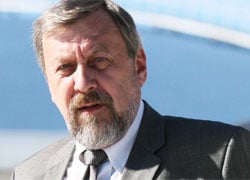Arithmetic of politics
47- Andrei Sannikov
- 13.04.2015, 12:51
- 99,299

A very simple guide.
You should not deal with science if you don't know arithmetic. You first need to learn numbers and then simple operations before proceeding to more difficult things. In other words, you should know the basics.
Politics has its own arithmetic.
In dictatorships, arithmetic is reduced to extremely simple notions and operations. The Belarusian opposition knows them well. The dictatorship of Lukashenka knows them, too, but it denies them and fights against them.
The main peculiarity of the dictatorship is that you cannot replace the dictatorial regime through elections.
Any dictatorship begins with the elimination of the election institution and replacing it with total falsifications organised by criminals from election commissions and security services. Dictators need pseudo-elections to convince people and the world that they enjoy support and keep power legally.
Elections that replace the dictatorial power by democratic one are held after or during the fall of the dictatorship.
The aim of the dictatorship is to retain power by any means. The aim of the opposition is to achieve the change of power.
The longer the dictatorship is in power, the more principled goals must the opposition set, especially during political campaigns.
Depending on its aims and tasks, the opposition's tactic and strategy must rest on resistance to the regime and non-acceptance it as a whole and in particular. The assumption that the dictatorial regime is legal and acceptable leads to the turning of the opposition into pseudo-opposition, which in fact becomes part of the regime, helping to strengthen it and prolong its existence.
A dialogue with the regime is possible only if it leads to its replacement, when groups interested in getting rid of the brazen authorities begin to form inside the dictatorship.
It's important to remember that it is the opposition that has the last word in defining the legality of the elections and the regime. Regardless of the strength or weakness of the opposition, regardless of the level of repression, regardless of the regime's flirting with Europe, the democratic opposition does not have the right to recognise the illegal dictatorial authorities.
The dictatorship cannot be recognised even under a threat of military invasion or occupation, otherwise the invasion and occupation will take place under the guise of the “legality” of the regime or with its help.
The logic of the resistance should also define the attitude towards the pseudo-elections organised by the dictatorship.
“Elections” to the puppet parliament have no sense at all, in the same way as the parliament has no actual authority in the dictatorship. Any internal and external contacts with it must be excluded.
Running in the “presidential elections” only has sense if they are accompanied with preparations and holding of mass protests. Protest actions during the campaign and on the election day at least do not allow the dictatorship to achieve an international recognition, and demonstrate to the international community the non-acceptance of the current regime by the people.
If the opposition doesn't have the will to organise mass protests, their function is substituted by boycot campaign, which is considered by international law a legal form of expressing an opinion on the acting authorities.
The above said is true only for the real opposition that wants Belarus to become a Belarusian, independent and democratic European state.
Sorry for explaining the basics.
Andrei Sannikov, leader of European Belarus civil campaign, specially for charter97.org









